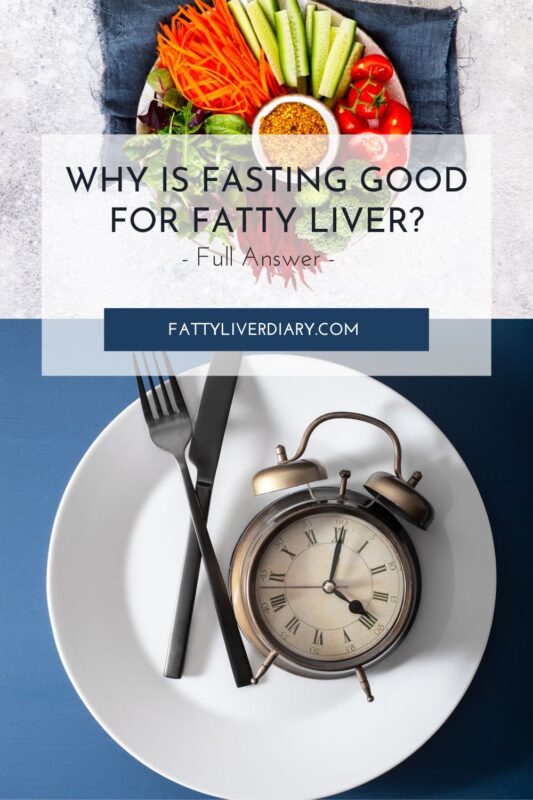Key Takeaways
- Experts agree that intermittent fasting is a potentially effective method for reversing fatty liver disease, as it can reduce liver fat and improve liver function.
- Studies indicate that different fasting methods, like the 5:2 diet, can be beneficial in reducing body weight and hepatic steatosis.
- Adopting healthy eating habits even with fasting is essential; a balanced diet, such as the Mediterranean diet, is recommended
Intermittent fasting has become more and more popular recently, but is it something you should do if you have been diagnosed with a fatty liver disease?
While more research is needed, many experts believe that fasting is good for reversing fatty liver as it helps reduce the amount of fat in the liver, and helps improve liver function.
Today I want to get a bit more in depth on the matter and share my personal opinion – as well as all the expert advice I could find on the matter of fasting the the general health of the liver (including help for reversing fatty liver).
IMPORTANT: Lifestyle choices and changes are essential for getting better. But healthcare professionals emphasize that not all diets fit every individual – and with fasting being somewhat in a grey area, it’s a good idea to assess your situation for your particular case.
Can Fasting Help Reverse Fatty Liver?
Many experts and studies claim that fasting can indeed help reverse fatty liver disease. I will link to them below, so you can read more in depth if you want all the data.
One study from the Egyptian Liver Journal found that a regular diet with alternate-day fasting is actually capable of reversing grade-1 fatty liver / MASLD (formerly NAFLD).
You can learn more about the different fatty liver grades here (basically, the severity of the condition).
Magnus Homler, MD, and his colleagues from the Department of Medicine at the Karolinska Institute in Stockholm, Sweden found that a 5:2 diet along with a low-carb high-fat diet is very effective in reducing body weight and hepatic steatosis.

Fasting helped increased the activity of certain enzymes that help break down fats and therefore the general consensus among experts is that fasting is indeed beneficial.
The best part is that I wasn’t able to find any studies concluding that fasting wouldn’t help somebody suffering from a fatty liver disease.
This is great news for sure, but before taking any drastic measures, make sure that you get your OK from your doctor!
While experts agree that fasting is generally good and healthy, there are some additional conditions and health issues that might still make it a bad idea.
At the same time, it’s not mandatory to fast in order to get yourself back in top shape.
I personally didn’t practice intermittent fasting and still managed to reverse my fatty liver.
This doesn’t mean I am against it or that I consider it unhelpful. I simply want to point out that if you find it very difficult to fast (which is something I do), you can still get healthy by sticking to a solid diet, exercising, and making the required lifestyle changes.
At the same time, my personal opinion is in line with that of the experts and I strongly believe that fasting can help you achieve your fatty liver reversal faster and is generally healthy for most individuals.
Make sure to always discuss with your doctor before starting any new program – Intermittent Fasting included. Spending so much time without eating could be counter-indicated for specific individuals, like those diagnosed with diabetes or other health issues.
Why Is Fasting Good for Fatty Liver
The beneficial effects of intermittent fasting on fatty liver have been shown in rodent studies. Also, data from observational human trials looks promising.
A study published in the Journal of Nutritional Biochemistry concluded that intermittent fasting (IF) and High-Interval Intensity Training (HIIT) are procedures that might help reverse the effects of NAFLD/MASLD.
In this study, the male mice in the experimental group were fed a high-fat diet for 16 weeks which then later showed liver fat accumulation and inflammation.
In the last four weeks, IF together with HIIT was implemented in the group which then successfully reduced the mice’s liver inflammation.
When you are obese and have fatty liver, doctors would often recommend you shed some pounds off. Fasting can create a calorie deficit.
This is how it is one of the most effective weight loss diets since your body has fewer calories than it needs to maintain its current weight when you fast.
Another study that shows why fasting is good for fatty liver is research involving 417 patients with NAFLD.
There was a significant difference in body weight (BW), body mass index (BMI), alanine transaminase (ALT), and aspartate aminotransferase (AST) between the control and fasting groups.
This means that fasting is good for fatty liver because it can help in weight management and improve liver enzyme levels for patients with fatty liver.
Fasting can also help reduce inflammation. Research shows that during the fasting period, pro-inflammatory markers are lower than usual, as with blood pressure, body weight, and fat.
In other words, the conclusion is pretty clear: we have plenty of studies and health experts proving the beneficial effects intermittent fasting can have.
How Often Should You Fast if You Have a Fatty Liver?

There are three most commonly used methods of fasting:
- Daily-time restricted feeding – this is also called the “16:8 approach”. You fast for 16 hours and eat within the 8-hour window every day.
- Periodic fasting – is also called the “5:2 diet”. You normally eat 5 days a week and restrict your calorie intake on the remaining 2 days.
- Alternate-day fasting – is as simple as its name. You do fasting every other day.
It depends on you what method of fasting you are going to choose, but you should ask your doctor first if fasting is right for you.
Also, it’s important to know that you should still stick to healthy eating habits even when fasting. If you only eat during a 2-hour window each day, but then you consume 5,000 calories and unhealthy food, you can’t expect many benefits.
What Can I Eat while Fasting?
During your fasting period, water and zero-calorie beverages (e.g. unsweetened tea and black coffee) can be consumed – but nothing else.
During your eating periods, you can eat as normally as you can. But with normal, I mean eating healthy and nutritious foods.
You can stick to a Mediterranean diet as you can hardly go wrong with complex, unrefined carbohydrates such as whole grains, leafy greens, lean meat, and healthy fats.

Even though you can eat normally with fasting, you still want to avoid eating high-calorie junk food, fried foods, and sweet treats as these types of food are bad for the liver (and unhealthy in general).
In other words, if you start fasting, this doesn’t mean you don’t have to be careful with what you eat and how much you eat.
PIN this for later!

Conclusion
While there are still many questions that need to be answered about intermittent fasting and fatty liver, the current evidence is encouraging.
If you have fatty liver, you may want to consider trying intermittent fasting as a way to improve your condition, after discussing this with your doctor and getting their OK.
If it seems too drastic and difficult, you don’t have to do it. You can still reverse your fatty liver by eating healthy meals throughout the day, exercising and generally taking care of your overall well being.

I was diagnosed with a fatty liver back in 2014 and managed to reverse it by mid-2015. Since then, I’ve been studying it, continuously updating my knowledge with the latest scientific findings and practical approaches to give others the help they need to reverse their condition.
My approach to managing fatty liver is holistic, balancing scientifically-backed information with real-life, practical advice based on personal, direct experience.
I am also the admin of the Fatty Liver Support Group on Facebook and the Fatty Liver Subreddit.


I really enjoy reading your blog. I was diagnosed with NAFLD and my Ferritin was at 10. I was 210 lbs at 5’5. This was in August 2023. I stopped taking medicine not knowing I would have severe withdrawals. By Dec 2023 I was down to 165 and now in Feb I’m at 162 my enzymes are at 17 from being 37. So, thank you.
Really happy to hear that things are working well for you – keep it up!